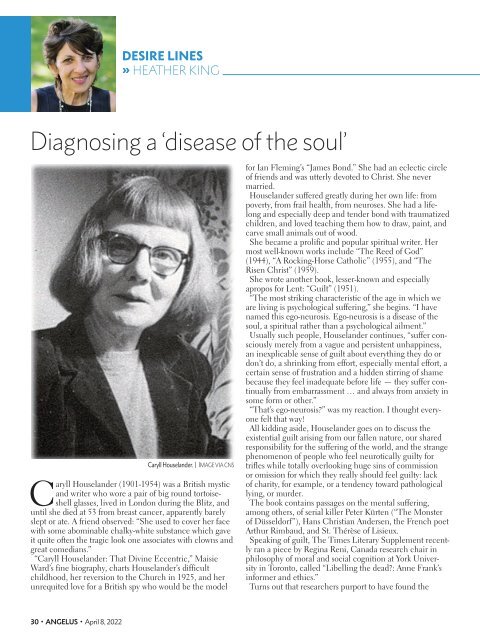Angelus News | April 8, 2022 | Vol. 7 No. 7
On the cover: The notion of the “metaverse,” touted by tech executives like Facebook’s Mark Zuckerberg, is no longer a far-off idea. In fact, we may be gradually entering it through our growing reliance on gadgets and the internet to get through daily life. On Page 12, Elise Ureneck looks into where the metaverse wants to take us and whether people of faith should resist or try to shape a world that isn’t totally “real.”
On the cover: The notion of the “metaverse,” touted by tech executives like Facebook’s Mark Zuckerberg, is no longer a far-off idea. In fact, we may be gradually entering it through our growing reliance on gadgets and the internet to get through daily life. On Page 12, Elise Ureneck looks into where the metaverse wants to take us and whether people of faith should resist or try to shape a world that isn’t totally “real.”
You also want an ePaper? Increase the reach of your titles
YUMPU automatically turns print PDFs into web optimized ePapers that Google loves.
DESIRE LINES<br />
HEATHER KING<br />
Diagnosing a ‘disease of the soul’<br />
Caryll Houselander. | IMAGE VIA CNS<br />
Caryll Houselander (1901-1954) was a British mystic<br />
and writer who wore a pair of big round tortoiseshell<br />
glasses, lived in London during the Blitz, and<br />
until she died at 53 from breast cancer, apparently barely<br />
slept or ate. A friend observed: “She used to cover her face<br />
with some abominable chalky-white substance which gave<br />
it quite often the tragic look one associates with clowns and<br />
great comedians.”<br />
“Caryll Houselander: That Divine Eccentric,” Maisie<br />
Ward’s fine biography, charts Houselander’s difficult<br />
childhood, her reversion to the Church in 1925, and her<br />
unrequited love for a British spy who would be the model<br />
for Ian Fleming’s “James Bond.” She had an eclectic circle<br />
of friends and was utterly devoted to Christ. She never<br />
married.<br />
Houselander suffered greatly during her own life: from<br />
poverty, from frail health, from neuroses. She had a lifelong<br />
and especially deep and tender bond with traumatized<br />
children, and loved teaching them how to draw, paint, and<br />
carve small animals out of wood.<br />
She became a prolific and popular spiritual writer. Her<br />
most well-known works include “The Reed of God”<br />
(1944), “A Rocking-Horse Catholic” (1955), and “The<br />
Risen Christ” (1959).<br />
She wrote another book, lesser-known and especially<br />
apropos for Lent: “Guilt” (1951).<br />
“The most striking characteristic of the age in which we<br />
are living is psychological suffering,” she begins. “I have<br />
named this ego-neurosis. Ego-neurosis is a disease of the<br />
soul, a spiritual rather than a psychological ailment.”<br />
Usually such people, Houselander continues, “suffer consciously<br />
merely from a vague and persistent unhappiness,<br />
an inexplicable sense of guilt about everything they do or<br />
don’t do, a shrinking from effort, especially mental effort, a<br />
certain sense of frustration and a hidden stirring of shame<br />
because they feel inadequate before life — they suffer continually<br />
from embarrassment … and always from anxiety in<br />
some form or other.”<br />
“That’s ego-neurosis?” was my reaction. I thought everyone<br />
felt that way!<br />
All kidding aside, Houselander goes on to discuss the<br />
existential guilt arising from our fallen nature, our shared<br />
responsibility for the suffering of the world, and the strange<br />
phenomenon of people who feel neurotically guilty for<br />
trifles while totally overlooking huge sins of commission<br />
or omission for which they really should feel guilty: lack<br />
of charity, for example, or a tendency toward pathological<br />
lying, or murder.<br />
The book contains passages on the mental suffering,<br />
among others, of serial killer Peter Kürten (“The Monster<br />
of Düsseldorf”), Hans Christian Andersen, the French poet<br />
Arthur Rimbaud, and St. Thérèse of Lisieux.<br />
Speaking of guilt, The Times Literary Supplement recently<br />
ran a piece by Regina Reni, Canada research chair in<br />
philosophy of moral and social cognition at York University<br />
in Toronto, called “Libelling the dead?: Anne Frank’s<br />
informer and ethics.”<br />
Turns out that researchers purport to have found the<br />
30 • ANGELUS • <strong>April</strong> 8, <strong>2022</strong>


















